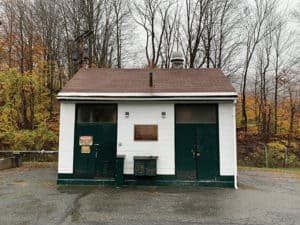By Katy Savage
Woodstock voters approved a $2.8 million expense to upgrade the South Woodstock wastewater system last spring, but now town leaders are at odds over who should pay for the upgrades.
Some residents believe the ballot clearly stated all residents should pay, while others said only those connected to the wastewater system should pay.

South Woodstock’s outdated wastewater system needs repair.
Confusion about the vote started in April, just after the bond vote passed on Town Meeting Day. A committee formed, but members of the committee are at disagreement. At an Oct. 19 Select Board meeting, Karim Houry, a South Woodstock resident and committee member, presented several reasons why the wastewater system should be everyone’s responsibility. He compared the sewer system to the education system, which everyone pays for regardless of if they have children or not.
By his estimate, if all homeowners in town paid for the upgrade, it would cost each person about $100 a year for the next 20 years. But, if only the 46 homes connected to the system paid for it, it would cost $4,000 per person each year.
The current system in South Woodstock hasn’t been upgraded since it was built in 1966. The Vermont Department of Environmental Services notified the town in 2017 that an upgrade was needed.
Select Board chair Mary Riley said if the sewer system is not upgraded, it will be decommissioned.
“All those users would not have a resource for wastewater,” she said.
Voters approved the $2.8 million expense. However, Riley said the estimate was significantly low. The Select Board approved a bid in May for just over $4 million. A grant totaling about $975,000 is expected to offset some of the cost, but residents will need to pay about $200,000 more than expected.
Susan Ford, a committee member who represented people on private septic systems in town, said people with private wastewater systems are already burdened by hefty costs of maintaining their own systems.
“Is it really equitable?” she asked. “Septic users have significant costs that they don’t get any help for. There are no grants, no town help, no other taxpayers helping you when your septic system fails.”
Ford and others at the meeting said they remember conversations prior to the vote that suggested only those connected to the sewer system would be responsible for the upgrade. Ford said left her ballot blank because of that confusion.
However, some said the wastewater system was a common good that everyone should pay for.
Resident Roger Logan compared it to the maintenance of backroads, which everyone contributes to regardless of if they drive the road or not.
“It’s a town responsibility, just as putting gravel on backroads is a town responsibility, just as fixing the Lincoln Bridge is a town responsibility,” Logan said. “It is the responsibility as a citizen of this town to pay for what was approved by the voters.”
Resident Alita Wilson said it was a “dangerous president” to make everybody pay. She said some people have made the choice to live outside of village areas to escape such fees.
“I think this is absolutely ludicrous that you would ask people to pay…who have made a choice to not live in the village,” she said.
David Green suggested implementing a sewer tax for both wastewater system users and non-users as an easy way to resolve the problem.
“We do all want to be good neighbors,” he said.
The board will discuss the issue again in November. Riley reminded board members that it was the Select Board’s responsibility to determine how to proceed.
Jennie Auster, an engineer hired by the town to evaluate the wastewater system, said she was asking bidders to hold their price until the confusion could be cleared up.




